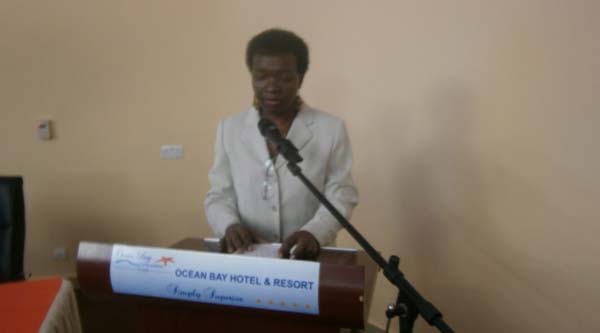
For this to happen, she added, there has to be a well defined system and structures that would guide the process.
The WFP country director delivered these remarks at the national validation workshop on feasibility study on local procurement for school feeding organised by the WFP, in collaboration with the Ministry of Basic and Secondary Education, held at the Ocean Bay Hotel recently.
She said designed school-feeding programmes had been shown to increase access to education and learning, and improved children’s health and nutrition, especially when integrated into comprehensive school health and nutrition programme.
The WFP country director to The Gambia disclosed that annually WFP imports an average of 2,301.44 metric tons of rice for approximately 100, 000 Gambian school children.
She said it was apparent that production and productivity levels of farmers must be greatly improved in order to get the right quantities of the commodities that WFP imports into the country annually for school feeding.
According to Madam Ginja, the local procurement feasibility study provides recommendations on models that could fit/tailor regional settings.
She said WFP was just one player in the equation and she therefore urged all the participants to continue the teamwork for better coordinated efforts.
Madam Ginja said the initiative would continue to engage a wide range of stakeholders to promote agricultural development by using locally-produced foods for school feeding, providing regular markets and a reliable income for smallholder farmers.
BaboucarrBouy, permanent secretary, Ministry of Basic and Secondary Education,said establishing a nationally-owned homegrown school feeding programme in a country like The Gambia was no mean undertaking given their experience with a donor-led school-feeding programme that had spanned over 40 years.
“This will not require the ultimate repositioning of ourselves as recipients of food aid from a trustworthy partner like World Food Programme but will also involve procuring the food we produce locally to feed our school children with,” PS Bouy said.
He said the main idea of the feasibility study was to subsequently strengthen the link between schools and communities, as well as enhance synergy between the school-feeding programme and farmers’ association.
In September 2010, PS Bouy said, an assessment of the school-feeding programme was conducted, which provided recommendations for the local procurement of some initial amounts of rice among other things.
Read Other Articles In Article (Archive)


